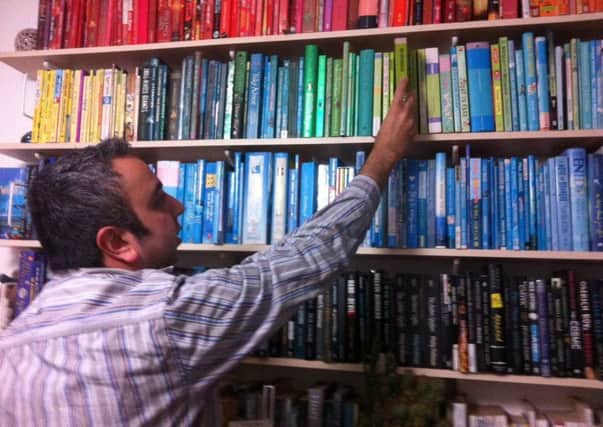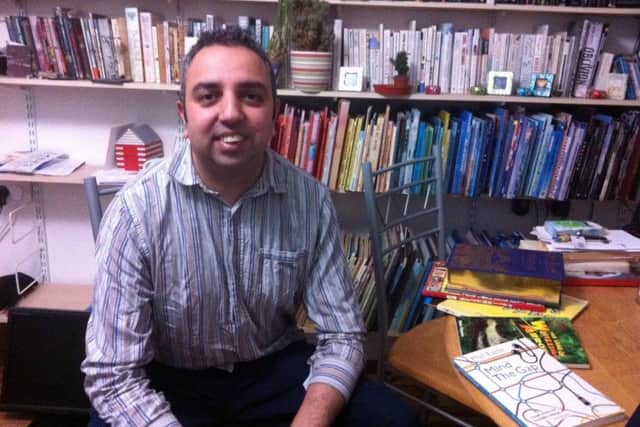How reluctant readers can discover the joy of books


Books should not become barriers. But it’s clear some youngsters and teenagers become disengaged from books, preferring the instant attraction of digital entertainment.
A Harry Potter or Twilight series may attract their attention, but too often as the series ends so does the reading habit.
Advertisement
Hide AdAdvertisement
Hide AdThat switch off can start even earlier, with younger children lacking the patience to peruse a printed page, when a screen can offer instant gratification.


For Preston based children and young people’s books expert and consultant Jake Hope it’s not so much a dilemma as a challenge.
Jake, (pictured), reads up to 1,000 books a year in the course of his work and is this year’s Vice Chairman of the prestigious Carnegie and Kate Greenaway Medal awards, the coveted accolades for young people’s authors and illustrators.
He has just written two chapters for a yet to be published book, “Reading by Right”, which look at reluctant readers and how libraries can engage them more.
Advertisement
Hide AdAdvertisement
Hide AdThe topic is close to his heart as for many years Jake, who grew up in Fleetwood and Great Eccleston, attending Shakespeare and Copp primary schools and later Hodgson’s High at Poulton, worked in the Lancashire county library service, latterly as a Reading Development Manager.


First he stresses children and young people are reading a lot even if they are not going by the book: “I think it’s become more a challenge to present books as a leisure activity. There’s perhaps a need to reframe how we present reading. Technology has changed society so much – actually we are reading all the time. Children do read and they read in very different ways.”
He emphasises the difference between screen and book time is that with a book a child can control the pace whereas with computers: “You are getting a visual imprint that’s been decided by somebody else.”
Books provide far more opportunities to talk around themes and subjects which arise.
Advertisement
Hide AdAdvertisement
Hide AdJake, whose home is now in Preston, advises opening the door to a book habit by making sure reading is combined with a social activity – be it in a reading group or linked to a craft event. Even getting young people to design posters or create film trailers can help spark interest.
Hosting an author event could provide an opportunity to look at the creative process of how stories are produced and different ways of writing.
“The younger you can get people into a habit of reading the better. At various points they (young people) read more and at various points they read less. If you can embed it early on they will always come back to it.”
A key time to build confidence and interest in and share books is when a child is aged between six and 12: “The great thing about books and stories is it’s your imagination that’s conjuring that and it’s you who has control – you can skip a page if it’s too much for you. Books can help you make sense of the world. Books and stories are the way we shape our ideas and experiences – that’s hugely exciting.”
Advertisement
Hide AdAdvertisement
Hide AdAcknowledging a “wall of text” can be off-putting but he points out there is such a wide selection of books on offer that there are always going to be different and visually more exciting and engaging books – be they graphic novels, illustration led texts or playful texts such as “Meanwhile: Pick Any Path” by Jason Shiga, a graphic novel where the reader can choose an outcome.
It is also important not to make reading onerous – it’s fine too to read below a young person’s ability level.
Jake, who studied for a Masters in Children’s Literature at Reading after taking an English degree at York University, said he believes good advice in bookshops and libraries is essential so that children and teenagers can be connected with books which will genuinely interest them.
He stressed: “Don’t give up and try and search for help and recommendations.
Advertisement
Hide AdAdvertisement
Hide Ad“It can be very overwhelming if you walk into a bookshop or library and are just faced with mountains of books and no idea what the content is and what the age suitability is. Actually providing access to books is very important and a lot of children now sadly don’t have access to books.”
He is writing an official blog celebrating the 80th anniversary of the Carnegie awards: “I’m going through every past Carnegie winner giving a blog entry and explaining what was special about the book – trying to persuade readers to familiarise themselves with these titles.”
He fears that in the present climate access to books is hit and miss with the closure of libraries and the fact that school libraries are not a statutory requirement. He argues the case for buying books as “mental nutrition”.
Lamenting the plight of the library service, with so many library closures in the county, he said: “I think Lancashire has been very hard hit, it staved (cuts) off for a long, long time and was bucking the trend actually, having had an awful lot of investment in its libraries. The danger is once a library closes that network cannot be built up again.”
Advertisement
Hide AdAdvertisement
Hide Ad• Jake advises taking a look at books such as those published by Barrington Stoke, The Spooks series by local author Joseph Delaney, work by Chris Riddell and Anna Fine’s books for young people, plus the Horrible Histories series. Philip Ridley‘s “Daffodil Scissors”, a National Theatre play for 8-12 year olds and “The Marvels” by Brian Selznick, a story told mainly in pictures and “Pirate Diary: The Journal of Jake Carpenter” by Richard Platt and Chris Riddell are also among books recommended by Jake.